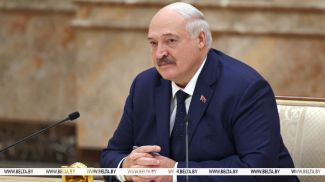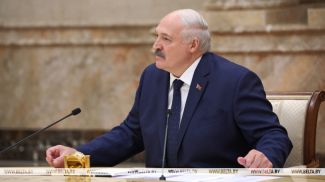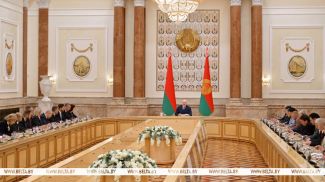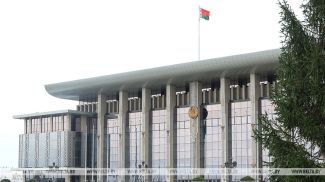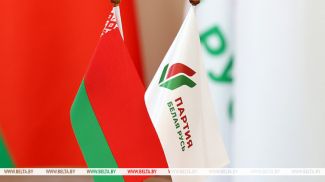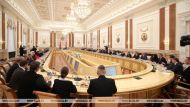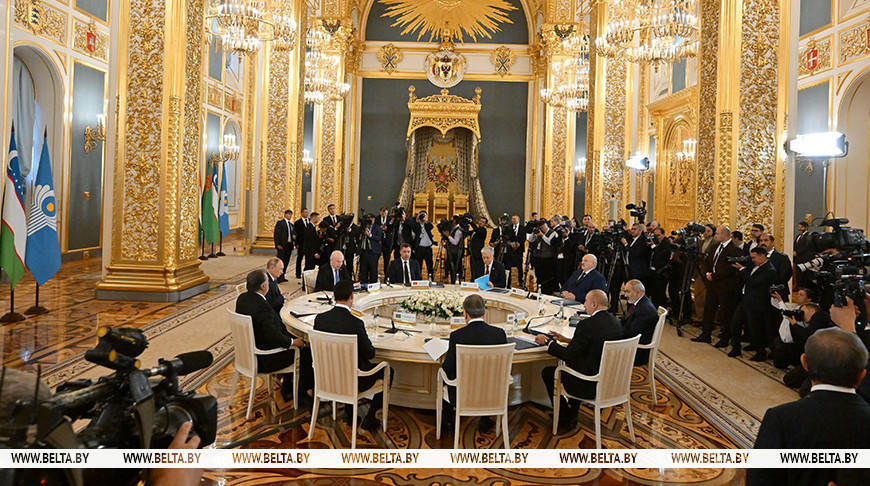
MOSCOW, 8 October (BelTA) — The CIS should be a strong union of powerful, economically self-sufficient sovereign states, Belarusian President Aleksandr Lukashenko said as he addressed the CIS summit held in Moscow on 8 October, BelTA has learned.
Aleksandr Lukashenko suggested thinking about more effective ways of using the regional integration potential. "The common goal is clear. We need a strong union of powerful, economically self-sufficient sovereign states. We are constantly talking about equal conditions and respect for national interests. A lot has already been done, but we still have a lot to strive for," the head of state said. He outlined several areas in this regard.
1. Strengthening the CIS international status
"The CIS should be constantly present in the global information agenda. We share the same assessment of many events affecting the development of not only the region, but also the humanity as a whole. We talk about it on different platforms, but, unfortunately, often separately," the Belarusian leader stated. "We should more often unite our voices into one, the voice of the CIS. This voice should sound as loud as possible and bring concrete actions. Especially nowadays."
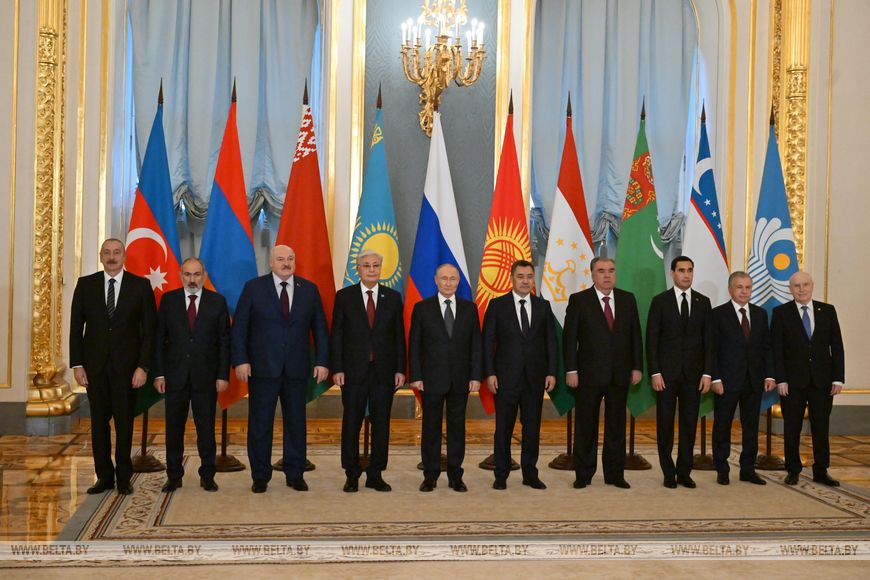
Aleksandr Lukashenko pointed out the deepest crisis in international relations. "As the Russian president said, this crisis is irreversible. Could we have imagined earlier that any country would bar the UN Secretary-General from entering the country [Israel made such a decision the other day]," the head of state cited an example. "It is important to stand together against illegal unilateral economic restrictions. Nowadays they concern not only Belarus and Russia. In fact, all CIS countries are at risk of secondary sanctions."
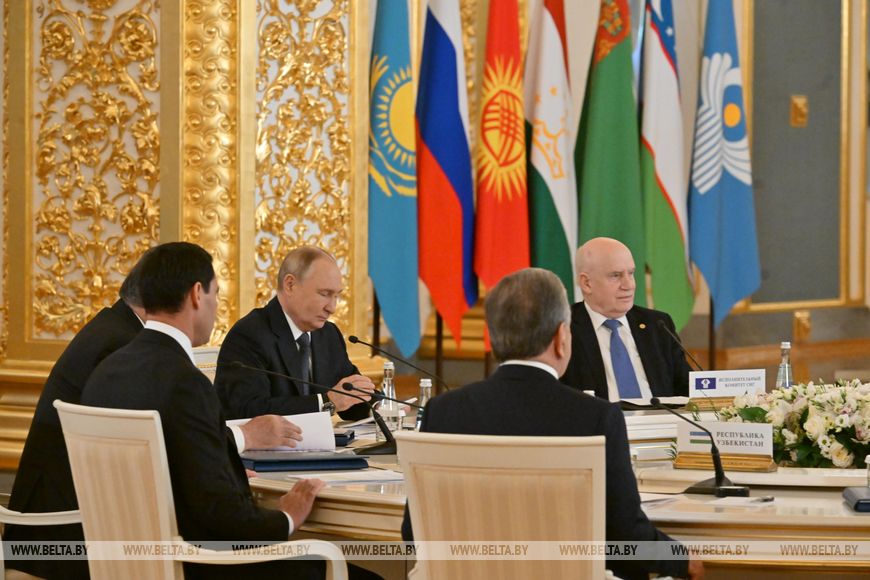
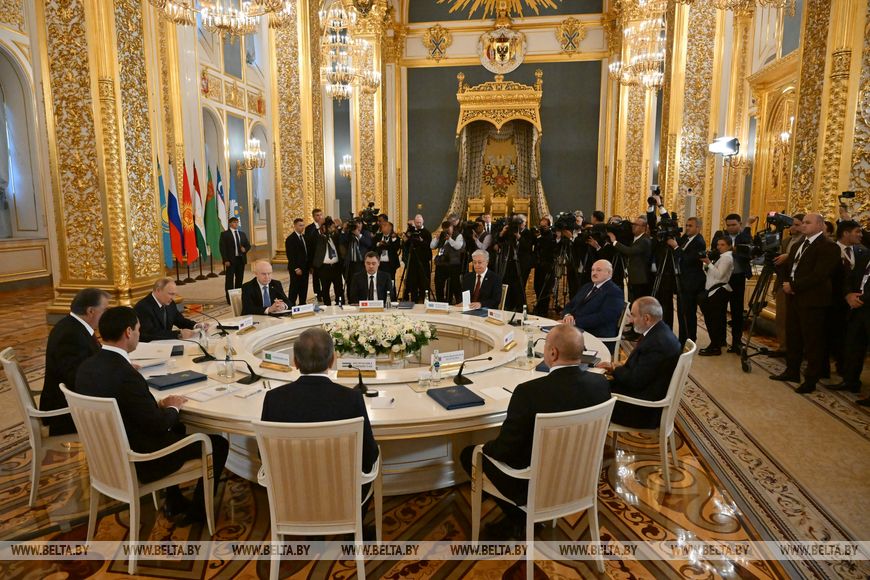
Aleksandr Lukashenko suggested thinking about more effective ways of using the regional integration potential. "The common goal is clear. We need a strong union of powerful, economically self-sufficient sovereign states. We are constantly talking about equal conditions and respect for national interests. A lot has already been done, but we still have a lot to strive for," the head of state said. He outlined several areas in this regard.
1. Strengthening the CIS international status
"The CIS should be constantly present in the global information agenda. We share the same assessment of many events affecting the development of not only the region, but also the humanity as a whole. We talk about it on different platforms, but, unfortunately, often separately," the Belarusian leader stated. "We should more often unite our voices into one, the voice of the CIS. This voice should sound as loud as possible and bring concrete actions. Especially nowadays."

Aleksandr Lukashenko pointed out the deepest crisis in international relations. "As the Russian president said, this crisis is irreversible. Could we have imagined earlier that any country would bar the UN Secretary-General from entering the country [Israel made such a decision the other day]," the head of state cited an example. "It is important to stand together against illegal unilateral economic restrictions. Nowadays they concern not only Belarus and Russia. In fact, all CIS countries are at risk of secondary sanctions."
2. Countering the spread of alien extremist ideologies and attempts to involve citizens in illegal activities, including terrorist ones.
Aleksandr Lukashenko thanked his counterpart President Shavkat Mirziyoyev of Uzbekistan for the timely initiative to develop the Program of Cooperation in Deradicalization.

The head of state also proposed to instruct the CIS Executive Committee to intensify the exchange of experience between law enforcers who specialize in cybersecurity.
3. Achieving the technological sovereignty in the CIS
Aleksandr Lukashenko characterized this task as complex and ambitious. “We make a lot of decisions, talk a lot, but, let's be frank, it's mostly humanitarian cooperation. Economy is the basis of everything,” the Belarusian leader said. “Therefore, technological sovereignty is the number one issue today. It is vital for the normal functioning of our economies. As Vladimir Vladimirovich said, we should add 4.7% to the GDP constantly and annually.
“Western right holders of the latest technological solutions refuse to share their achievements, do not guarantee support and maintenance of the machinery and equipment already purchased legally. This also applies to healthcare, which is abysmal. Therefore, we vitally need to introduce our own inventions and developments into production, we need our own component base,” the Belarusian leader observed.
He is confident that the CIS countries have something to rely on in addressing this issue, because the current positive economic performance of the CIS countries is the result of the ties kept intact in all areas.
4. Promoting and cultivating the CIS values system
Aleksandr Lukashenko called this area strategically important. The matter pertains to the “historically established, not imposed or contrived European or American” values. “This is what remains when new generations take over,” the head of state said.
According to the president, the CIS was set up by politicians who know the value of the unity of nations. Entering politics in the foreseeable future will be a generation with a good understanding of the importance of national sovereignty and independence. “Whether they will be able to preserve the experience of union building we have accumulated depends on our work today, including with young people,” he said.

Aleksandr Lukashenko described what should be passed on to the new generation. This includes the unique Soviet experience of peoples’ movement towards a common goal without infringement of national interests. “This is a model of consolidation of diverse cultures, religions, and traditions in the name of the common goal,” the president said.
“Our children should know common historical achievements, such as the Great Victory, the labor feat of the post-war generation, the first flight into space and many others. Every achievement relies on the joint contribution of our peoples. We are simply obliged to pass this history over to those who will come to replace us,” the Belarusian head of state said.
According to him, it is not enough to tell stories, write books and make films. It is important to maintain the level of simple human communication. This task, for example, is fulfilled through the revival of international youth construction projects within the CIS. Such a tradition has already been restored in Belarus. For example, the youth project to build the National Center of Patriotic Education is underway in Brest Fortress. The CIS youth are taking part in the construction.





